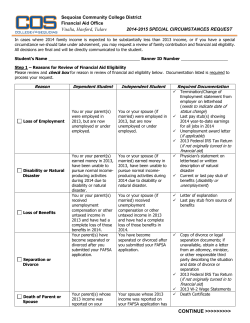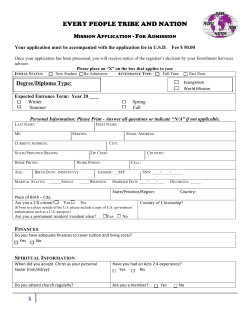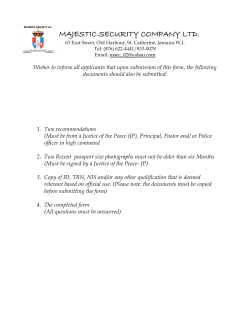
FAMILY LAW GENERAL INFORMATION
FAMILY LAW GENERAL INFORMATION PROCEDURES - Your active involvement in a family law case begins with your initial pleading which will either initiate the lawsuit, or respond to a lawsuit brought against you by another party. If one party signs a Waiver of Citation after receiving a copy of the initial pleadings, there is no requirement for personal service unless a Temporary Restraining Order, Protective Order, or other extraordinary relief is requested. Depending on whether there are ex parte orders, the court may set a hearing date within 10 to 30 days for a Temporary Orders hearing. We will try to negotiate Agreed Orders to preclude the expense of a hearing, however, under the best of circumstances you should anticipate at least one appearance before the court. The Tarrant County Family Courts are located in the Family Law Center at the corner of Weatherford and Commerce streets in downtown Fort Worth. (200 East Weatherford Street). There is a parking garage located on Calhoun Street where you should park. Temporary Orders are heard by the Associate Judge of each Family Court so you should plan to wait in the hall outside the Associate Judge’s courtroom at the scheduled time. Because the dockets are crowded, please be prepared to spend the morning and make tentative arrangements for the afternoon. Take a book! There is a minimum 60 day waiting period for a divorce from the date of filing if the divorce decree is completely agreed. If we have an Agreed Decree of Divorce, the final appearance will be a formality called a prove-up to relate the provisions of the decree to the court. Modifications are not subject to a mandatory waiting period and, if agreed, can be handled more expeditiously. The progress of any case is dependent upon the parties, attorneys, and the scheduling of the courts. The dockets are not controlled by the attorneys but by the Courts and their personnel. The time it takes to set an actual trial may range from a few months to several years. An immediate trial is not an option except in extraordinary cases. Your assistance in completing and delivering the necessary forms and documents to the office is one important part you play in assuring that your case will proceed as smoothly as possible. Family law cases involve a great deal of interaction between attorney and client and often require the attorney to be out of the office for hearings, conferences, mediations and other meetings. Our staff is an integral part of the practice and work closely with all attorneys on all cases. Please understand that many issues can be addressed by our staff who keep attorneys informed of any activity in your case, even if you do not speak directly to your attorney. It is imperative that you cooperate with our staff and treat them with respect. Disrespect to our staff will not be tolerated. ALTERNATE DISPUTE RESOLUTION - It is the policy of Texas to promote the amicable and nonjudicial settlement of disputes involving children and families. Alternate Dispute Resolution (“ADR”) procedures are designed to allow parties to resolve their disputes without court intervention. Mediation is used extensively in family law matters and has proven to be very successful in both settling disputes and reducing the costs associated with litigation. An agreed resolution to a case is Family Law General Information (updated 3/2015) Page 1 almost always preferable to orders resulting from trial. The costs of litigation are not only financial but emotional, as well. If children are involved, we encourage you to negotiate for their sake as well as your own. GROUNDS FOR DIVORCE 1. 2. 3. 4. 5. 6. 7. Insupportability - On the petition of either party to a marriage, a divorce may be decreed without regard to fault if the marriage has become insupportable because of discord or conflict of personalities that destroys the legitimate ends of the marriage relationship and prevents any reasonable expectation of reconciliation. Cruelty - A divorce may be decreed in favor of one spouse if the other is guilty of cruel treatment toward the complaining spouse of a nature that renders further living together insupportable. Adultery - A divorce may be decreed in favor of one spouse if the other spouse has committed adultery. Conviction of a felony - A divorce may be decreed in favor of one spouse if, since the marriage, the other spouse: (1) has been convicted of a felony; (2) has been imprisoned for at least one year in a state or federal penitentiary; and (3) has not been pardoned. Abandonment - A divorce may be decreed in favor of one spouse if the other spouse left the complaining spouse with the intention of abandonment and remained away for at least one year. Living Apart - A divorce may be decreed in favor of either spouse if the spouses have lived apart without cohabitation for at least three years. Confinement in a Mental Hospital - A divorce may be decreed in favor of one spouse if at filing: (1) the other spouse has been confined in a mental hospital for at least three years; and (2) it appears that the spouse’s mental disorder is of such a degree and nature that he is not likely to adjust, or that if he adjusts it is probable that he will suffer a relapse. TEMPORARY SPOUSAL SUPPORT - One spouse may be ordered to provide temporary spousal support for the other spouse during the pendency of the divorce action. The formula for determining temporary support is basically: TOTAL INCOME OF THE PARTIES, LESS CHILD SUPPORT EQUALS DISPOSABLE INCOME FOR TWO PARTIES. DIVIDE THAT BY 2 AND SUBTRACT FROM THE LOWEST NET INCOME TO GET POSSIBLE SPOUSAL SUPPORT. This is considered a means of temporarily equalizing income for the use of both parties and will be greatly influenced by the amount available for division. Generally, a showing of need is necessary to accomplish this and the court will consider who is paying outstanding bills and debts, expenses for the care of the children, and respective earning ability in determining spousal support. There is NO requirement that the court order spousal support. Family Law General Information (updated 3/2015) Page 2 MAINTENANCE (ALIMONY) - There is a rebuttable presumption that maintenance is not warranted unless the receiver has exercised diligence in earning sufficient income or developing skills to provide for their minimum reasonable needs during separation and pendency of the divorce. Maintenance shall be limited to the shortest reasonable time necessary to allow the receiver to obtain appropriate employment or develop a skill to meet his or her minimum reasonable needs and the award shall remain in effect for no more than 5 years for a marriage of up to 20 years / 7 years for a marriage of up to 30 years / 10 years for a marriage of more than 30 years, unless the receiver’s ability to meet those needs is substantially diminished by: a physical or mental disability; duties as custodian of a young child; or other compelling impediment to employment. Maintenance is limited to the lesser of $5,000 or 20% of the payor’s gross income, excluding VA disability compensation, social security benefits and disability, and workers’ compensation benefits. The actual amount of maintenance is to be set so as to provide for the minimum reasonable needs of the receiver considering all assets. Maintenance shall terminate on the death of either party or the remarriage or the cohabitation on a conjugal basis of the receiver. An order awarding maintenance can later be modified by the court under specific guidelines. The court may not enforce by contempt any agreed maintenance order beyond the period the court could have ordered, although enforcement as a contract is available. PROPERTY SEPARATE PROPERTY - A spouse’s separate property consists of property owned by the spouse before marriage, property acquired by the spouse during marriage by gift, devise, or descent, and damages recovered for personal injuries sustained by a spouse during the marriage except any recovery for loss of earnings or earning capacity during the marriage. COMMUNITY PROPERTY - A couple’s community property consists of all property, other than separate property, acquired by either party during the marriage, including salary income, real estate purchased, furniture and furnishings, cars, boats, retirement accounts and benefits, investment accounts, interest and dividend income from separate property. All property is presumed community property until proven to be one spouse’s separate property. DIVISION OF PROPERTY UPON DIVORCE - The court will divide the assets of the community in a manner that the court deems just and right, having due regard for the rights of each party and any children of the marriage. The court strongly supports the division of property by agreement since that allows the parties to divide their property and results in less courtroom litigation. Numerous factors may influence the court’s decision, including fault in the breakup, disparity of earning power or education, health and age, needs of the children, community indebtedness, tax consequences, need for future support, nature of the property, wasting of community assets, separate property, reimbursement, gifts to or by a spouse during marriage, expected inheritance, and any other factor relevant to a just and Family Law General Information (updated 3/2015) Page 3 right division. TEMPORARY USE AND POSSESSION OF PROPERTY- The court will determine which party will have temporary use and possession of the property at a Temporary Orders Hearing if the parties cannot agree. Usually one party will retain the house, especially if minor children are involved. Each party will have possession of a car if there are two and the rest of the property will be temporarily awarded to one or the other. The court will also allocate the payment of bills between the parties. If a Temporary Restraining Order is issued at the time of filing, the Respondent will be ordered to refrain from actions that may deplete the community assets unfairly. This Temporary Restraining Order will normally be made a Mutual Temporary Injunction in the Temporary Orders and will apply equally to both parties. CONSERVATORSHIP - THE BEST INTEREST OF THE CHILDREN IS THE PRIMARY CONCERN In Texas, custody is divided into 3 basic classifications. Although conservators are usually parents, the court may appoint non-parent conservators. An order establishing conservatorship specifies which of the rights and duties of a parent are to be exercised by the conservators. Conservatorship is modifiable when circumstances change after the entry of an order. RIGHTS AND DUTIES OF PARENTAL CONSERVATORS DURING PERIODS OF POSSESSION: (1) the duty of care, control, protection, and reasonable discipline of the child; (2) the duty to support the child, including providing the child with clothing, food, shelter, and medical and dental care not involving an invasive procedure; (3) the right to consent for the child to medical and dental care not involving an invasive procedure; (4) the right to direct the moral and religious training of the child. RIGHTS AND DUTIES OF PARENTAL CONSERVATORS AT ALL TIMES: (1) to receive information from the other parent concerning the health, education, and welfare of the child; and (2) to confer with the other parent as possible before decisions concerning the health, education, and welfare of the child; (3) of access to medical, dental, psychological, and educational records of the child; (4) to consult with a physician, dentist, or psychologist of the child; (5) to consult with school officials concerning the child’s welfare, education and school activities; (6) to attend school activities; (7) to be designated on the child’s records as a person to be notified in case of an emergency; (8) to consent to medical, dental, and surgical treatment during an emergency involving an immediate danger to the health and safety of the child; and (9) to manage the estate of the child to the extent that the estate has been created by the parent or the parent’s family. Family Law General Information (updated 3/2015) Page 4 JOINT MANAGING CONSERVATORS (“JMC”) Both parents have the general rights and duties of parent/ conservators and the exclusive rights and duties can be assigned by agreement or court order. Parent/JMCs are presumed to be in the best interest of the child, but JMC does not necessarily mean equal possession or decreased child support. The rights and duties listed under Sole Managing Conservator below are assigned to the conservators either jointly, individually, or independently either by agreement of the parties or by the Court. If a written agreement is filed, the court may appoint parent/joint managing conservators only if the agreement: (1) establishes the area for the residence of the child, or designates who has the right to establish the primary residence; (2) specifies the rights and duties of each parent regarding the child’s physical care, support, and education; (3) includes provisions to minimize disruption of the child’s education, daily routine, and association with friends; (4) allocates between parents, independently, jointly, or exclusively, all of the remaining rights and duties of a parent; (5) is voluntarily and knowingly made and has not been repudiated by either parent when the order is rendered; and (6) is in the best interest of the child. SOLE MANAGING CONSERVATOR (“SMC”) - Unless limited by court order, a parent/sole managing conservator has all the general rights and duties of a parent/conservator and the following exclusive rights: (1) (2) (3) (4) (5) (6) (7) (8) (9) the right to establish the primary residence of the child; the right to consent to medical, dental, and surgical treatment involving invasive procedures; the right to consent to psychiatric and psychological treatment; the right to receive and give receipt for child support and to hold or disburse funds for the benefit of the child; the right to represent the child legally and to make decisions of substantial legal significance concerning the child; the right to consent to marriage and to enlistment in the armed services of the United States; the right to make decisions concerning the child’s education; the right to the services and earnings of the child; and the duty, except when a guardian of the child’s estate exists, to manage the child’s estate, including the right to act as an agent for the child’s estate if the child’s action is required by a state, the United States, or a foreign government; POSSESSORY CONSERVATOR (“PC”) - Unless limited by court order, a parent/possessory Family Law General Information (updated 3/2015) Page 5 conservator has all the rights and duties of a parent/conservator and any other right or duty expressly granted to the possessory conservator in the order. VISITATION - POSSESSION & ACCESS Specific times for the Possession of children by the conservators are set out in a decree or order. The Court has the discretion to issue orders establishing a possession schedule in the best interest of the children. Parental arguments on visitation are not conducive to a child’s mental well-being. Parents without primary possession can and should play an important part in a child’s life. Antagonism between parents can undermine the benefits a child can reap from two families. Interaction with two loving and caring parents is ALWAYS in the best interest of a child. Although one parent may dislike the other, children should be encouraged to have a positive relationship with both parents and their extended families, as well. Remember, every person that cares about your child is a benefit to your child. Texas has a Standard Possession Order that provides for visitation by agreement or, if the parties cannot agree, visitation is according to a minimum schedule set by the Legislature with an alternative for extended beginning and ending times. In most circumstances the choice of extended periods belongs to the party exercising possession periods not the parent with primary possession. The general scheme is as shown on the attached form marked as Exhibit A. The standard possession order is designed to address all holidays, summer vacation, and special events whether the parties live near or far apart and generally divides these between the parties as equitably as possible with 30 days in the summer for the parent without primary possession. Because the standard possession order is well accepted by the courts, it is generally a good idea to make formal written adjustments only if absolutely necessary. Visitation is another issue that may be modified as circumstances change. RECENT DEVELOPMENTS: Many courts are moving toward a more evenly divided possession schedule, whether they are week on / week off or another equally shared schedule. Many times the child support issue in shared possession situations is decided by an “off set” where the court considers both parents financial assets and obligations in light of the children’s needs. CHILD SUPPORT - Each parent has the duty to support his or her child, while that child is a minor or is fully enrolled toward a high school diploma, until the end of the school year in which the child graduates. Texas has specific guidelines for establishing the amount of child support due. The following table shows the percentage of an Obligor’s net resources to be paid as child support which, just as conservatorship and visitation, may be modified as circumstances change. Family Law General Information (updated 3/2015) Page 6 PERCENTAGE OF NET RESOURCES FOR STANDARD GUIDELINE CHILD SUPPORT NUMBER OF CHILDREN BEFORE THE COURT NUMBER OF OTHER CHILDREN FOR WHOM OBLIGOR HAS A LEGAL DUTY OF SUPPORT 1 2 3 4 5 6 7 0 20.00 25.00 30.00 35.00 40.00 40.00 40.0 1 17.50 22.50 27.38 32.20 37.33 37.71 38.0 2 16.00 20.63 25.20 30.33 35.43 36.00 36.4 3 14.75 19.00 24.00 29.00 34.00 34.67 35.2 4 13.60 18.33 23.14 28.00 32.89 33.60 34.1 5 13.33 17.86 22.50 27.22 32.00 32.73 33.3 6 13.14 17.50 22.00 26.60 31.27 32.00 32.6 7 13.00 17.22 21.60 26.09 30.67 31.38 32.0 When children are involved in a case, the child support obligor is normally required to provide health insurance with each party being responsible for 50% of all uninsured medical costs. ENFORCEMENT - CONTEMPT ACTIONS Interference with court ordered possession and access or failure to pay child support as ordered can result in various punishments, including an order to pay attorneys fees for the other party, make up time being awarded to the other parent, the requirement for posting of a cash bond to secure obedience to the order, or incarceration in the county jail. It is NEVER a good idea to ignore a Judge’s order since he or she will retain your case until the children are grown or move from the county. GROUNDS FOR MODIFICATION Modification of Sole Managing Conservatorship (SMC) The court may modify an order that designates a SMC of a child of any age if: (1) the circumstances of the child, the SMC, PC, or another party have materially and substantially changed; and (2) the appointment of a new SMC would be a positive improvement for the child. Family Law General Information (updated 3/2015) Page 7 To modify SMC to parental joint managing conservators (JMC) the court must find that (1) the circumstances of the child or the SMC have materially and substantially changed; (2) the retention of the SMC would be detrimental to the welfare of the child; and (3) the appointment of the parents as JMCs would be a positive improvement for and in the best interest of the child. Modification of Joint Managing Conservatorship (JMC) The court may modify the conservatorship, possession and access, determination of primary residence, or terms and conditions of an order if it is in the best interest of the child and: (1) the circumstances of the child or the JMCs have materially and substantially changed; (2) the child is at least 12 and has expressed to the Court in chambers the child’s preference for primary residence; (3) the conservator with primary residence has relinquished that for at least 6 months. To modify the right to designate residence within one year, an affidavit must show that at least one of following exists: (1) the child’s environment may endanger his physical health or significantly impair his emotional development, (2) the one currently designating residence is seeking or consenting to the change and it is in the child’s best interest, or (3) possession of the child has been voluntarily relinquished for not less than 6 months and it is in the child’s best interest. Modification of Child Support The court may modify an order for child support if: (1) the circumstances of the child or a person affected by the order have materially and substantially changed; (2) it has been 3 years since the order was rendered or modified and the monthly amount of child support differs by either 20 percent or $100 from the amount that would be awarded under the guidelines. MISCELLANEOUS (1) Health Insurance - Because each spouse is responsible for the necessities of life for the other spouse, it is imperative that neither party cancel existing health insurance before the divorce is final. COBRA is a federal law that requires employers to extend to the ex-spouse and dependents of their employees the option to continue health insurance coverage for up to 18 months. The non-employee spouse must pay the premiums for coverage as specified in the information available from the employer. IT IS YOUR RESPONSIBILITY TO ARRANGE FOR AND PAY THE PREMIUMS FOR Family Law General Information (updated 3/2015) Page 8 ANY COBRA COVERAGE SET OUT IN YOUR DECREE. DO NOT DELAY ACTION AND DO NOT RELY ON OTHERS TO INSURE YOU HAVE COVERAGE INTACT. (2) Life Insurance - It is advisable to include in a decree ordering child support a provision for a life insurance policy on the life of the child support obligor equal to the amount of child support owed until the youngest child reaches the age of 18 or graduates from high school. I suggest that my clients carry the policy and pay the premiums, if not a paid up policy. Should the obligor die without the policy in effect, you have scant recourse available. Even a District Court judge cannot punish the dead and the insurance company is not going to reinstate a policy that means an immediate payoff on death benefits. (3) Auto Insurance - Do not cancel auto insurance during the pendency of the divorce unless authorized to do so by an order of the court. It is highly probable that any vehicles are community property and should remain insured until the divorce is final. At the date of divorce, each party will become responsible for individual coverage. Older children’s insurance should be addressed as well. (4) Federal Income Tax - Federal law requires you file an income tax return based on your marital status as of December 31 of each year. Each spouse is responsible for 50% of the tax liability on all community income from January 1 until the date of divorce, even if you are not married on December 31. While the parties may agree to be responsible for 100% of the tax liability on their respective incomes, YOU SHOULD BE AWARE THE IRS CAN HOLD YOU LEGALLY RESPONSIBLE FOR TAX LIABILITY ON COMMUNITY INCOME. YOU SHOULD SEEK THE ADVICE OF YOUR CPA OR TAX SPECIALIST ON THIS ISSUE. Exemptions - Federal Tax Code rules provide that the parent with primary possession of the children has the right to claim the tax exemptions. You may agree to transfer the right to claim an exemption by filing an IRS Form 8332. Payment of periodic child support cannot be deducted from the Obligor’s income Receipt of child support payments is non-taxable to the obligee. (5) Real Estate Transfers - Many divorce decrees require transfers of real property. You will not receive an abstract of title or an owner’s title insurance policy on any real property from or through this office. This office does not perform title examinations on properties transferred pursuant to a decree of divorce. Any real estate transfer documents prepared by this office will be based on the information supplied by you and will make no representation to you as to the status of title or the existence of assessments, encroachments, zoning, liens or restrictions affecting title to such property. This office will not render an attorney’s title opinion in connection with such property. (6) State Bar of Texas - All lawyers in Texas have an obligation to maintain a high standard of ethical conduct toward their clients and others. To enforce this standard, the State Bar of Texas Family Law General Information (updated 3/2015) Page 9 investigates and prosecutes complaints of professional misconduct against attorneys licensed in Texas. If you have questions concerning attorney misconduct, you may write to the Office of the General Counsel, State Bar of Texas, P.O. Box 12487, Austin, Texas 78711, or call (512) 463-1381 / 1-800-932-1900. COSTS - Initial retainers vary from $5,000.00 to $20,000.00, depending on anticipated time and expense. Initial retainers should be paid in full prior to any action by this office. All filing fees and service fees are in addition to the initial retainer and must be paid in full prior to initiation of action by this office. The total of the retainer and costs will be credited to your account balance in a general operating account and is not subject to interest income toward your account. Your final costs may increase due to the circumstances of your case. While we attempt to hold down the costs of litigation, we are not able to dictate the costs occasioned by the rules of court procedure or initiated by opposing parties or counsel. Your retainer pays for professional experience and expertise as well as time devoted exclusively to your case. It is our position that you should not enter into a Family Law representation contract lightly. Because representing one client may preclude our firm from taking another case, we generally do not refund retainers. We urge you to be sure you are serious about a lawsuit before making a commitment and asking us to do the same. Should the balance of the retainer fall below $1,500.00, clients are expected to replenish such retainer to maintain at least $1,500.00 on account for the finalization of the case, within 10 days of notice from this office. When a case is set for mediation, Client's account must reflect a retainer balance of $3,500.00 to cover minimum mediation costs at least 30 days before the mediation deadline. Clients must agree to deposit a minimum trial retainer of $10,000.00 for at least 60 days prior to trial date. If such retainer is not deposited, Client agrees Attorney may withdraw from representation. Family Law General Information (updated 3/2015) Page 10
© Copyright 2025









